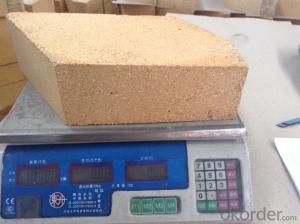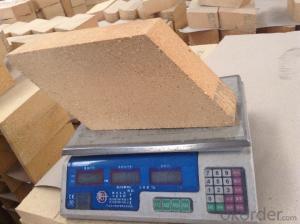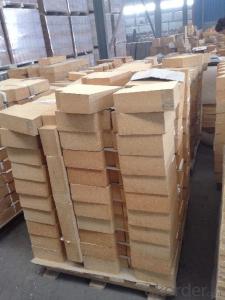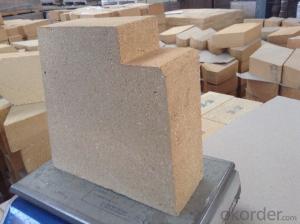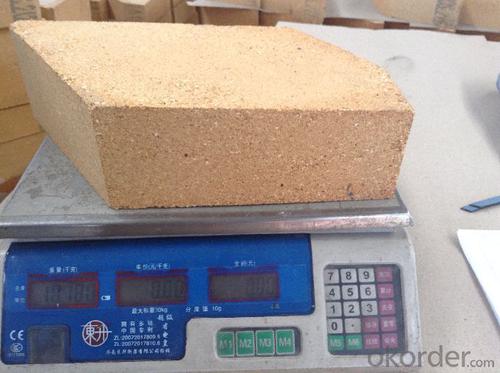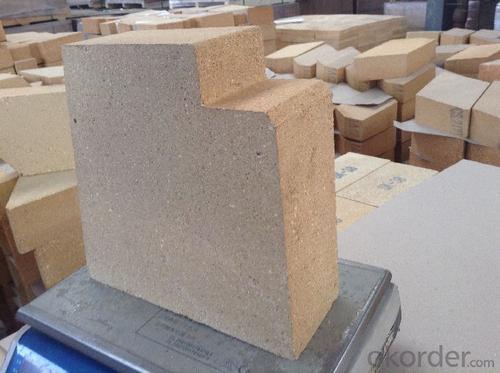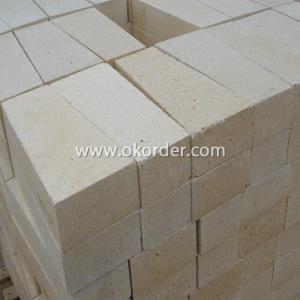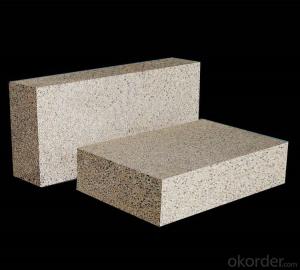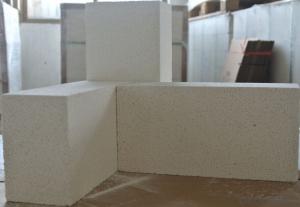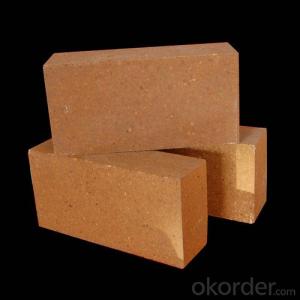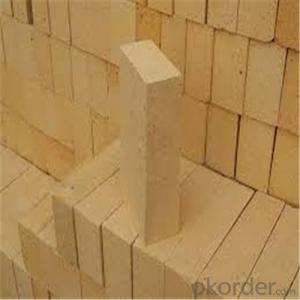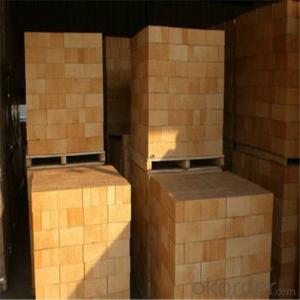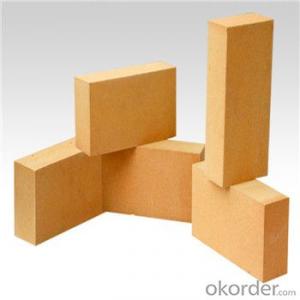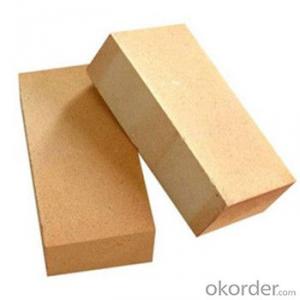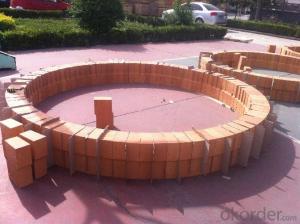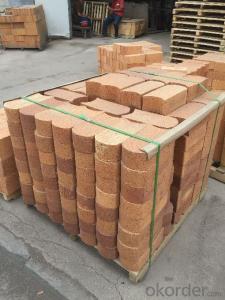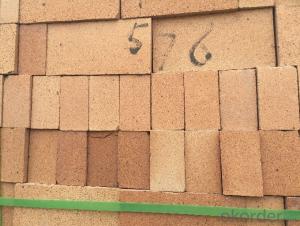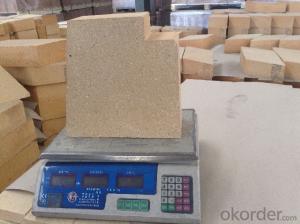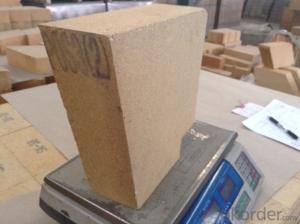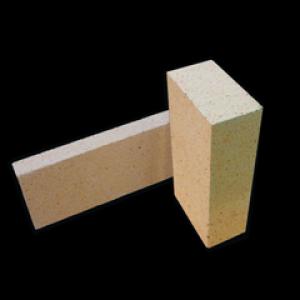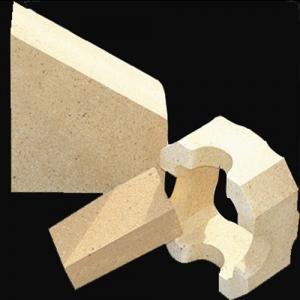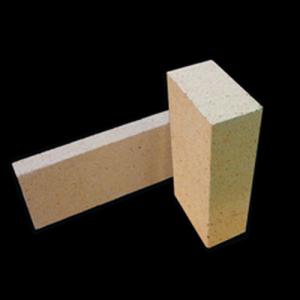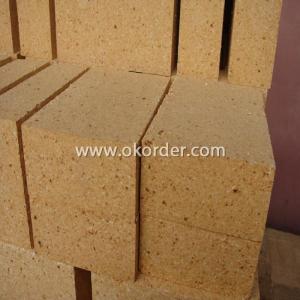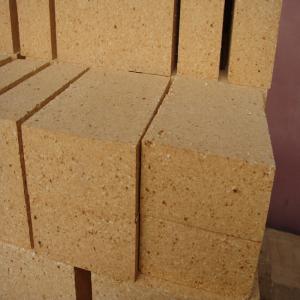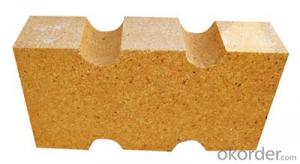Fireclay Brick with Al2O3 Content Around 31%
- Loading Port:
- Qingdao
- Payment Terms:
- TT OR LC
- Min Order Qty:
- 17 m.t
- Supply Capability:
- 10000 m.t/month
OKorder Service Pledge
OKorder Financial Service
You Might Also Like
FIRE CLAY BRICK
CMAX fireclay bricks are made from clinker clay. The alumina content ranges from 36% to 48%.
Application
CMAX fireclay bricks are commonly applied in blast furnace, hot blast furnace, teeming ladle, glass furnace, etc.
Features
◆Low thermal conductivity ◆High refractoriness
◆High mechanical strength ◆Excellent thermal shock resistance
ITEM | UNF42 | UNF46 | ZGN42 | RN40 | TDL45-12 |
Refractoriness, ℃ | 1730 | 1750 | 1750 | 1730 | 1760 |
Bulk Density, g/cm3 | 2.15 | 2.25 | 2.3 | 2.15 | 2.37 |
Apparent Porosity, % | 22 | 20 | 15 | 24 | 12 |
C.C.S, Mpa | 30 | 35 | 58 | 28 | 68 |
Refractories Under Load (0.2Mpa),℃ | 1400 | 1420 | 1450 | 1430 | 1500 |
Reheating Linear Change, % | 1400℃x2h 0.1~-0.4 | 1430℃x2h 0~-0.1 | 1450℃x2h 0~-0.2 | 1350℃x2h 0~-0.3 | 1450℃x2h -0.1~+0.05 |
Al2O3 Content , % | 42 | 46 | 42 | 40 | 45 |
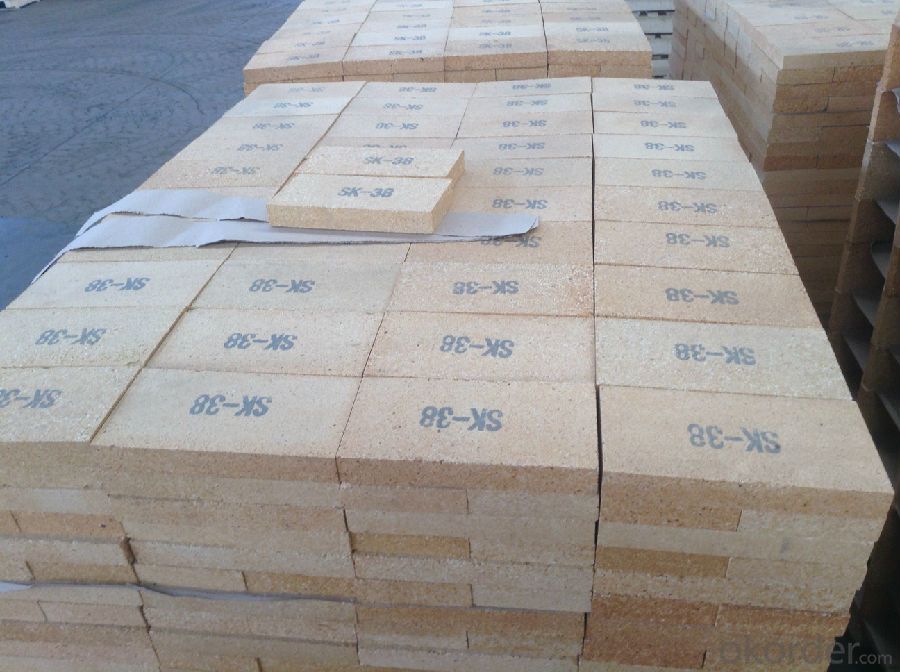
- Q: What is light brick and what are the characteristics of light brick?
- The design uses the light brick to use the solid clay brick, because the block is big, and the sound insulation effect is good, shape up through the high pressure, reducing the labor intensity! Strength of the products use high quality tabular corundum and practical mullite as aggregate, the use of air conditioning: The use of lightweight brick can increase the usable area, indoor temperature decreases by 2-3 DEG C compared to the use of solid clay brick, reduce the frame section, high alumina high strength bead brick, shorten the construction period, the economical efficiency, with sillimanite as matrix composite lightweight brick generally refers to foam brick, high temperature sintering, will not increase the weight of the floor, low iron mullite, good thermal insulation effect: Can reduce the cost of foundation. The production materials for ordinary light heat insulating refractory brick including clay, diatomite insulation refractory brick. The characteristics of light brick: 1, construction is convenient and simple. 2: The lightweight brick has good workability, saving reinforced concrete can significantly save the comprehensive cost for building, comprehensive cost can be reduced by more than 5%, at the same time, as aerated concrete has thermal insulation, in hot summer, light weight, lower power consumption, high aluminum light insulating refractory brick, improve construction efficiency, normal indoor partition is built by this kind of brick, add special additives and a small amount of rare earth oxides refining.
- Q: The advantages of using alkalinty refractory brick?
- Magnesia chrome and other spinel refractories alkalinity refractories; (2) the alkalescent chrome magnesite refractories, alkaline solvent resistance is strong, usually refers to the magnesia refractory material, dolomite brick and calcareous refractory materials, dolomite refractory materials and lime refractory materials, acid flux or acid refractory chemical reaction. Mainly used in alkaline steel furnace and non-ferrous smelting furnace. Alkaline refractory material at high temperature for alkaline slag. Mainly as the following categories, but the acid slag, forsterite refractories and magnalium: (1)strongly alkaline magnesia brick, magnesia carbon brick and cement kiln
- Q: which kind of refractory bricks do coke oven and oxtongue brick belong to ( ) A, silica?brick B, clay brick C, high alumina brick
- Beef tongue is to regulate the flow of gas, gas flow is not the same, so is the temperature, so choose the temperature resistance brick which is clay brick only.
- Q: Should refractory cement hang inner core when use carbon steel pipe make water heating hearth by self?
- The main purpose of adding refractory cement or refractory brick is to avoid the sulfur in coal in the combustion process of corroding metal, especially under the conditions of high water content and low temperature of flue gas. If use natural gas after desulfurization, without considering the life circumstances, can not be adopted, but the carbon steel pipe is unsuitable for what you said, safety first! Earnestly!
- Q: What material are used to burn firebrick?
- Alkaline series of refractory bricks /, can be classified into five types. Refractory bricks are generally made from refractory clay (white clay) or other refractory materials. Refractory brick according to the composition of refractory material, that is, silicon aluminum refractory brick / carbon containing refractory brick / thermal insulation refractory brick/ zirconium containing refractory brick /
- Q: What kinds of annealing furnace refractory bricks there are?
- But the energy saving effect is good, but also can use lightwight heat insulating brick, but the price is higher than that of clay brick
- Q: How good is the hardness of corundum refractory brick?
- The basic materials of corundum refractories are fused corundum or sintered corundum. the refractory brick containing more than 90% of Al2O3 is called corundum refractory brick. so, corundum refractory brick. Corundum has a high hardness (9 level of Mohs hardness) such as zirconium corundum refractory brick. Corundum refractory brick is resistant to acid well and melting point is also high, also known as pure alumina refractory brick products, , it has a good effect. These are closely related with the structure of the Al - 0 key, titanium corundum refractory brick, and other basic slag. It is used in high temperature oxidizing atmosphere or in reducing atmosphere. the metal and glass solution have good stability. a-Al2O3 is the main material of high temperature refractory brick and high temperature electrical insulating material .
- Q: What type of refractory brick won't deform or crackbe for a long time in the temprature of about 1600 degrees?
- 1. , mullite poly light ball brick type, andalusite brick type: MJ-1600 MJ-1700 the temperature is higher than 1600 C. 3, the refractory bricks that won't deform or crack in the 1600 degrees Celsius for a long time includs the following several commonly used bricks: GMZ-80 GMZ-75 the temperature is higher than 1650 DEG C, 2, corundum mullite brick type
- Q: can diatomite?brick be used as thermal insulation refractory brick?
- yes, it has good thermal insulation the raw material is cheap, diatomite?brick is a kind of thermal insulation refractory brick with good performance.
Send your message to us
Fireclay Brick with Al2O3 Content Around 31%
- Loading Port:
- Qingdao
- Payment Terms:
- TT OR LC
- Min Order Qty:
- 17 m.t
- Supply Capability:
- 10000 m.t/month
OKorder Service Pledge
OKorder Financial Service
Similar products
Hot products
Hot Searches
Related keywords
